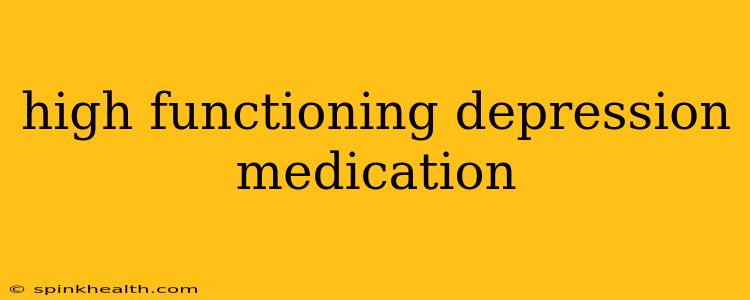High-functioning depression. The term itself sounds like a paradox, doesn't it? It conjures images of someone seemingly thriving, juggling careers, families, and social lives, while secretly battling a silent, debilitating illness. This isn't a fictional character; it's a reality for many individuals, and understanding how to navigate their unique challenges, particularly regarding medication, is crucial.
This isn't simply about popping a pill and magically feeling better. It’s a journey of self-discovery, professional guidance, and a commitment to long-term well-being. This exploration will delve into the intricacies of medication for high-functioning depression, addressing common questions and misconceptions along the way.
What Medications are Commonly Prescribed for High-Functioning Depression?
The type of medication prescribed for high-functioning depression varies significantly depending on the individual's specific symptoms and overall health. There isn't a "one-size-fits-all" approach. Often, antidepressants are the first line of defense. These can include:
- Selective Serotonin Reuptake Inhibitors (SSRIs): These are commonly prescribed due to their generally good tolerability and effectiveness in treating depression symptoms. Examples include sertraline (Zoloft), fluoxetine (Prozac), and escitalopram (Lexapro).
- Serotonin-Norepinephrine Reuptake Inhibitors (SNRIs): These work on both serotonin and norepinephrine, neurotransmitters vital for mood regulation. Venlafaxine (Effexor) and duloxetine (Cymbalta) fall into this category.
- Tricyclic Antidepressants (TCAs): While older than SSRIs and SNRIs, TCAs can still be effective for certain individuals, but they often have more side effects.
- Monoamine Oxidase Inhibitors (MAOIs): These are reserved for cases where other antidepressants haven't worked, as they have more stringent dietary restrictions and potential interactions with other medications.
It's crucial to remember: The decision of which medication to prescribe, and at what dosage, rests solely with a qualified psychiatrist or other healthcare professional. Self-medicating is incredibly dangerous and could have serious consequences.
What are the Side Effects of Medication for High-Functioning Depression?
Side effects vary greatly depending on the individual and the specific medication. Some common side effects of antidepressants include:
- Nausea: This is a frequent early side effect that often subsides.
- Headaches: These can range from mild to severe.
- Weight changes: Some antidepressants may cause weight gain or loss.
- Sleep disturbances: This can manifest as insomnia or excessive sleepiness.
- Sexual dysfunction: This is a common concern for many individuals taking antidepressants.
It’s important to discuss any concerns about side effects with your doctor. They can often adjust the dosage or switch you to a different medication to minimize unwanted effects.
Does High-Functioning Depression Require Different Treatment Than Other Types of Depression?
While the underlying mechanisms of high-functioning depression are similar to other types of depression, the treatment approach might differ slightly. This is primarily because individuals with high-functioning depression might be less likely to seek help due to their ability to maintain outward appearances of normalcy.
Treatment for high-functioning depression often focuses on:
- Early intervention: Addressing symptoms before they significantly impact daily life is crucial.
- Psychotherapy: Cognitive Behavioral Therapy (CBT) and other forms of therapy can be incredibly valuable in addressing underlying thought patterns and coping mechanisms.
- Lifestyle modifications: This might involve improving sleep hygiene, incorporating regular exercise, and maintaining a balanced diet.
Can High-Functioning Depression Be Managed Without Medication?
For some individuals, lifestyle changes and psychotherapy might be sufficient to manage their symptoms. However, for many, medication plays a vital role in achieving symptom relief and preventing relapse. The decision of whether or not to use medication should be made in consultation with a healthcare professional.
How Long Does it Take for Medication to Work for High-Functioning Depression?
The time it takes for antidepressants to become fully effective varies considerably, ranging from several weeks to several months. It's crucial to be patient and work closely with your doctor to monitor your progress and make adjustments as needed.
Navigating high-functioning depression requires a comprehensive and personalized approach. It's a journey that demands patience, self-awareness, and a strong support system. Remember, seeking professional help is a sign of strength, not weakness. By understanding the available options and working collaboratively with a healthcare team, individuals can find the support they need to live fulfilling and meaningful lives.

